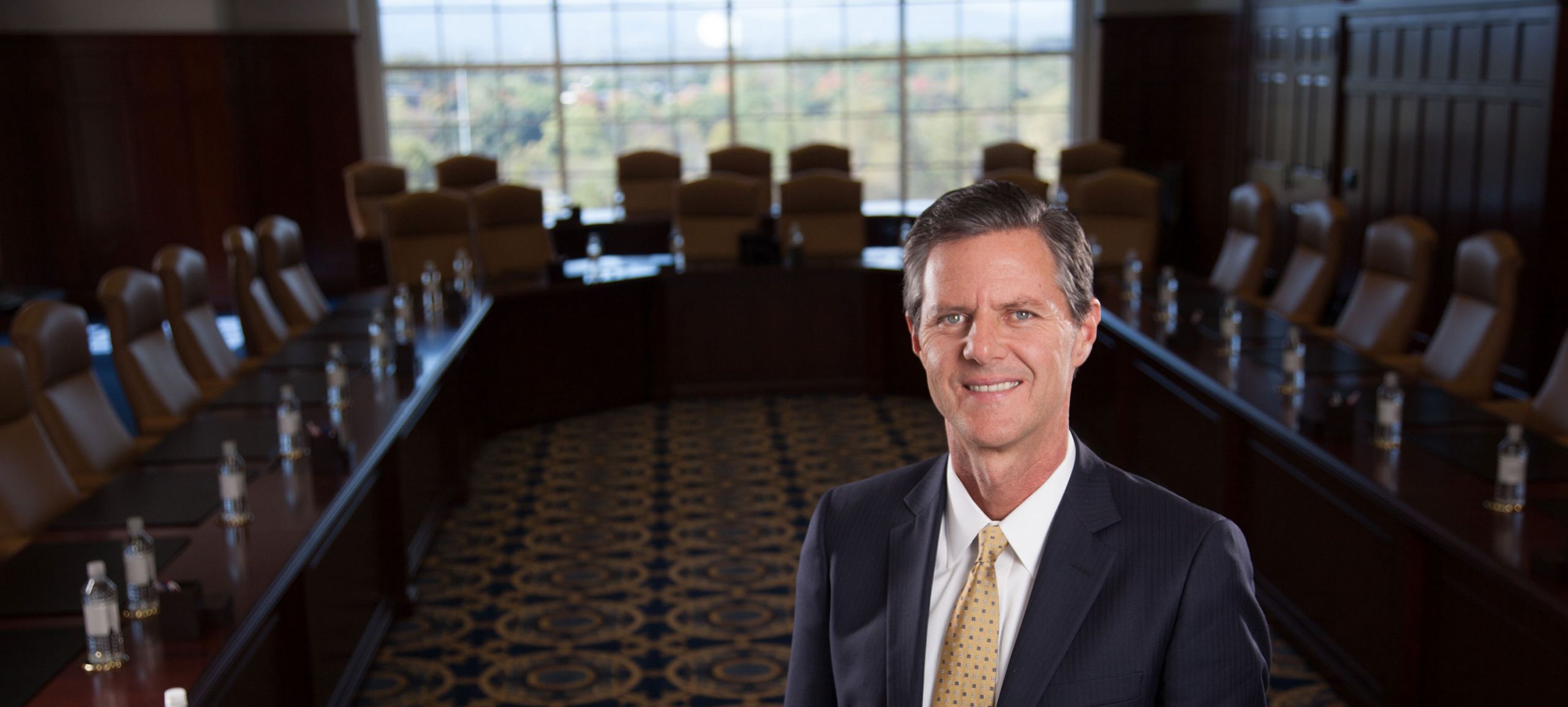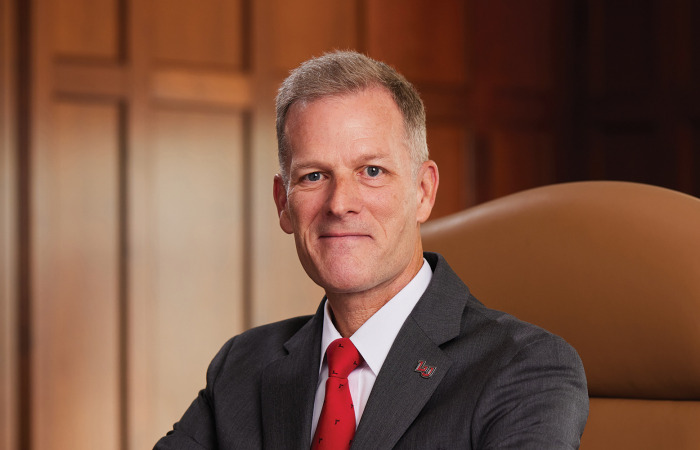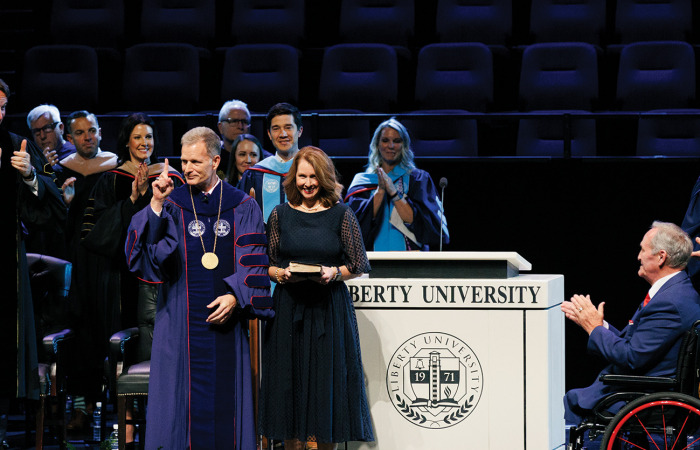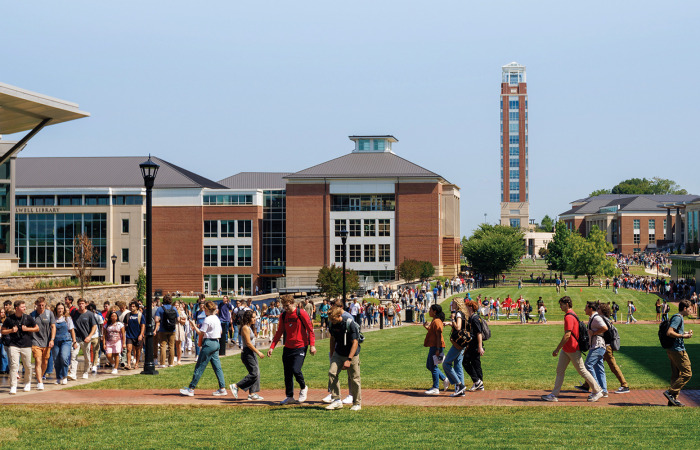Below is the speech delivered by President Jerry Falwell, Jr. during the grand opening of the Jerry Falwell Library on Jan. 15, 2014. View the full ceremony above.
Thirty-seven years ago this week, my father and a large group of Liberty students held a prayer meeting outdoors in the snow next to an old barn not far from where I am standing right now. In those days, there were no school buildings, only the foundations of some dorms that the school had started to build in 1972 but could not afford to complete. There was no campus, no highway next door, no Walmart and no River Ridge Mall, just the remnants of a dairy farm and a lot of open land. The students were attending class in old rented public school buildings around town. Their dormitories were in an old hotel downtown and at a youth camp on Treasure Island in the middle of the James River. And they rode rickety old school buses back and forth between all those different facilities. Robbie Hiner, who is with us today, sang “I Want That Mountain” at that prayer meeting. We still have videos of that event. That day, the student body was praying for something that seemed almost impossible: a new campus, dorms, classrooms, dining halls, a permanent home for Liberty. There was no money on hand, only renewed hope because the church and school had just finished paying off an important debt that gave it new freedom to grow and expand.
Just a few years before, my father had announced plans to build a Christian university that provided everything that the top universities in this country provided — academic excellence, world-class facilities, NCAA Division I athletics, Jeffersonian architecture. It’s funny, you can go back and watch videos of his sermons from the early 1970s and listen to his predictions for Liberty: fielding NCAA Division I athletic teams, having world-class facilities and academic excellence. It sounds like he is describing exactly what is happening at Liberty now as if he had a crystal ball that showed him the future.
This was quite a lofty goal for an independent Baptist church in a small town in the South but Dad had witnessed miraculous and unprecedented growth between 1956 and 1973 at Thomas Road Baptist Church. He founded the church as a 22-year-old kid fresh out of Bible college. The church had grown from 35 charter members meeting in an old storefront and bottling company plant to thousands of members with its own new 3,000-seat auditorium created from a design by Thomas Jefferson, a national weekly radio and television broadcast, a K-12 private school, a large youth camp on Treasure Island, a home for alcoholics, and in 1971 this university was founded. One of the earliest publications was titled, “Ten Years of Miracles,” describing how the church, its radio and TV broadcast and related ministries had grown beyond anyone’s wildest dreams in a sleepy little town where nothing like that was supposed to happen.
I traveled with Dad all over the country and the world before I was even 11 years old. People wanted to hear about what had happened in Lynchburg and how they could replicate what had happened here. It was my job to man the tables in the back of the churches and arenas where Dad would speak and vinyl sermon records and books were sold to offset the travel costs. On one occasion in California, at age 7, I remember selling so many books and records that I had no place to put all the cash. My father loved to tell the story of me pulling money out of every pocket, out of my socks, out of my shirt, wherever I could find a place to stuff coins or bills. Dad was inspired by other visionaries of his time like Walt Disney and tenacious leaders like Vince Lombardi. He took me to Disneyland in California seven times before Disney World in Florida even opened in 1971 and his favorite speech, “What it Takes to Be No. 1” by Lombardi, hung on his office wall. We visited other Christian colleges like Tennessee Temple University and ORU to get ideas for the new college here.
The phenomenal growth at Thomas Road Baptist Church in its earliest years is what attracted Elmer Towns and so many others to Lynchburg. Elmer included the church in his popular book, “The 10 Largest Sunday Schools in America,” in the early 1970s. The church and TV ministry gave Dad the platform necessary to build a major university from scratch. Early students came here to learn about how Thomas Road Baptist Church had been such a success and that same miraculous growth inspired Dad to dream big about the future of Liberty. The success in those early years also bolstered his faith and convinced him that God had big plans for this university. He was right but, as it turned out, God was operating on a different schedule than Dad was. I think God’s timing came as a surprise to Dad, but he never questioned that God had big plans for Liberty.
Today, we are not here to honor my father for what he accomplished in the early days. We are here to honor him for his tenacity, faith, and unwavering commitment to the dream and vision for Liberty University through the almost four decades of trials and tribulations that ensued soon after Liberty was founded. You see, things changed for Dad’s life and ministry in the early 1970s. It seemed like before that time, nothing could go wrong and it seemed that very little went right afterward.
You can clearly see the transition when you look at his sermon topics. In the early days, his sermons focused on winning the world for Christ, on being the best at whatever you did, about being number one. When speaking in other churches, he spoke about how those churches could double the size of their congregations in six months, he spoke about how Thomas Road (Baptist Church) had grown so fast, had helped so many in need, and had reached so many people for Christ.
In the 1970s, his sermon themes became more focused on how to deal with troubles, how life was full of troubles, how there were several bad days for every good day, about how a man’s greatness was not measured by his talent or wealth or accomplishments, but rather by what it takes to discourage him. He preached sermon after sermon to Liberty students built around the theme “Never Quit” — no matter how difficult your circumstances might become. He kept preaching those same principles until his death, and quotes from those sermons now are etched in stone at his memorial because he did not just preach those principles, he lived them.
Don’t get me wrong. I am not saying that nothing good happened during the next few decades starting in the ’70s. The church and school continued to grow and the television broadcast became more prominent. The university was blessed with temporary classroom and dormitory buildings. Dad was distracted from Liberty briefly in the 1980s by what he felt was his duty to organize a nationwide coalition of Protestants, Catholics, Jews, Mormons, and people of other faiths who shared the same basic family values to make their voices heard in the political realm. He had a profound impact on the direction of the nation but faced unrelenting attacks and ridicule from political opposition. He was happy to return his primary focus here to Liberty University during the last two decades of his life because of the eternal impact he believed Liberty could have on the nation and the world by Training Champions for Christ to work in every profession.
In the first four decades of this school’s existence, nothing came easy like it did in the early years of Dad’s ministry. It seemed like, for every step forward, there were several steps back. Financial pressures grew, government agencies began to regulate the young school in ways never before experienced, there were zoning challenges, and the college faced scrutiny from accrediting bodies, from banks and other lenders. But there were no fatal blows. These problems and pressures were all part of the normal pressures that come with building and operating a big organization — payroll, capital needs, other operational costs. Dad was referring to these challenges when he would often preach that God will humble you, but he will never humiliate you. And he said more than once that if he had known when Liberty was founded how difficult it would be, he might never have started a college.
I call these first four decades of Liberty’s history its wilderness years. I joined Liberty in 1988 after becoming an attorney and helped manage the financial restructuring that took most of the 1990s to complete. Those were dark days that required us to rely completely on God for everything. There was no planning for the future. We could only focus on surviving one week at a time — make the next payroll, borrow the money to keep the school operating one more month; do whatever we could to appease this creditor or that creditor.
But, Dad’s faith through all those dark days was unshakeable. I believe the blessings that he had witnessed in the early years helped sustain his faith. His life’s verse was Philippians 1:6, “He which hath begun a good work in you will perform it until the day of Jesus Christ.” He wrote that reference after his name every time he signed his autograph or signed someone’s Bible.
Most men simply would have given up and walked away when faced with the seemingly insurmountable obstacles that Liberty University encountered during its first few decades of existence, but he kept the faith and refused to turn back. That is why the board is honoring him today with the naming of this new library.
Liberty’s board has never named a building on campus after my father before. Sodexo named Doc’s Diner for him a few years ago and donors named Snowflex lodge for Al Barrick and Dad jointly, but this is the only facility on campus that our board has named for my father. That is mainly because Dad never wanted anything named for him. He knew he was just being used by God to do something that was bigger than he was. I guess that is why we had to wait until after he was gone to name a building for him. There’s nothing he can do about it now. I read recently that Walt Disney never planned to include his first name for Disney World in Florida but his brother, Roy, insisted on calling it Walt Disney World after Walt died. Walt Disney World opened about five years after Walt’s death, so there are some parallels there with someone Dad admired.
This library is the centerpiece of a five-year, $500 million reconstruction of the Liberty campus, replacing temporary buildings built in the 1970s and ’80s with permanent university structures designed and built to endure for generations. A few years ago, I was on vacation with my family. They were out on the beach. I stayed back in the room to answer email. One of the emails was a series of questions from Ron Brown, the editor of the Liberty Journal, about Liberty’s amazing growth in recent days. As I answered those questions, I was really overwhelmed when it suddenly hit me what was happening at Liberty.
I looked at the financial progress, the academic and athletic achievements, the AA rating from Standard & Poor’s, the fact that Liberty would soon become the youngest college in history to accumulate $1 billion in net assets, and I realized that all of that was the fulfillment of God’s promise to continue the good work that I had witnessed as a young boy in the 1960s and ’70s. God had only put his plans on pause. It was a long pause — about 40 years.
Over the years, I had often thought about those early years and wondered why the trajectory of growth at Liberty had plateaued for so long. We will never know God’s purposes — whether he was testing our faith, or simply teaching us how to rely on him for all our needs — but one thing is for sure, my father never lost faith. I then understood for the first time why Philippians 1:6 was his life’s verse. We were all thrilled that he lived just long enough to see Liberty turn the corner and just long enough to see the prosperity that is so evident today beginning to take shape. He, like Moses, got a glimpse of the promised land and today we are gathered here to honor him for his undying faith, his perseverance, his determination, his tenacity in the face of seemingly insurmountable odds and his upbeat attitude and love for people that never waned in spite of all the turmoil and challenges that he was facing personally on an almost daily basis.
I was being interviewed recently by The Washington Post. Referencing how much Liberty had grown and changed in such a short time, the reporter asked, “What would your father say if he could come back now and see all the growth and progress at Liberty over the last six years?” I replied without hesitation that he would say, “I told you so.”
Jerry Falwell, Jr.
President




